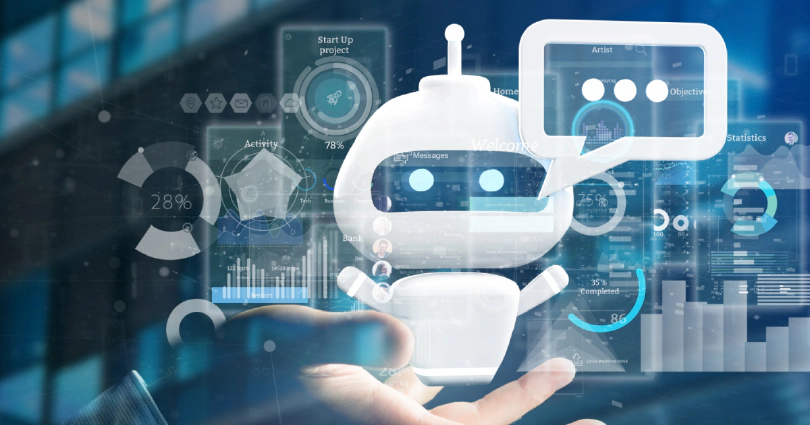Table of Contents
- Introduction
- How machine learning, artificial intelligence is changing the HR industry
- Benefits of Robotic Automation in HRTECH
- Challenges of Robotic Automation in HRTECH
- Conclusion
Introduction
Robotic automation, powered by machine learning and artificial intelligence , is changing the way HR operates, making it more efficient and effective. HR departments are using robotic automation to automate repetitive, low-value tasks, allowing HR professionals to focus on more strategic initiatives that drive business success. In this whitepaper, we will explore how robotic automation is changing the HR industry, including the benefits and challenges of this technology.
Robotic automation, powered by machine learning and artificial intelligence (AI), is revolutionizing the HRTECH industry. In this whitepaper, we will explore how robotic automation is changing the HR industry, the benefits it offers, and the challenges that organizations face when implementing these technologies.
Robotic automation is the use of software and algorithms to perform repetitive and time-consuming tasks. These tasks can include data entry, data processing, and even communication with candidates and employees. By automating these tasks, HR departments can improve their efficiency, reduce their workload, and free up time to focus on more strategic initiatives.
One of the key benefits of robotic automation in HRTECH is improved accuracy. Machine learning algorithms can analyze large amounts of data and identify patterns that may be missed by humans. This can help HR departments to make more informed decisions and reduce errors in the hiring process.
Another benefit of robotic automation in HRTECH is increased speed. By automating tasks such as resume screening and candidate outreach, HR departments can significantly reduce the time it takes to fill open positions. This can help organizations to stay competitive in the talent marketplace and reduce their time-to-hire.
However, implementing robotic automation in HRTECH also presents challenges. One of the main challenges is ensuring that these technologies do not create bias in the hiring process. Machine learning algorithms can be trained on biased data, which can result in discriminatory hiring practices. To avoid this, HR departments must ensure that their algorithms are trained on unbiased data and regularly monitored for bias.
Another challenge of implementing robotic automation in HRTECH is the potential for job loss. Automating tasks that were previously performed by humans can lead to job displacement. However, many experts predict that these technologies will create new job opportunities in areas such as data analysis and software development.

How machine learning, artificial intelligence is changing the HR industry
Machine learning and artificial intelligence (AI) are rapidly transforming the HR industry by enabling HR professionals to automate tasks, streamline processes, and gain valuable insights into workforce trends and employee behavior. Here are some specific ways in which machine learning and AI are changing the HR industry:
- Improved recruitment and selection: AI-powered recruiting tools can automate candidate screening, identify the best candidates for a role based on their skills and experience, and reduce the potential for human bias in the selection process.
- Personalized employee experiences: Machine learning algorithms can analyze data on employee behavior, preferences, and performance to create more personalized training and development plans, as well as customized recognition and rewards programs.
- Predictive analytics: AI-powered analytics tools can analyze data from various HR processes and systems to identify trends, predict future workforce needs, and optimize HR strategies.
- Enhanced performance management: Machine learning algorithms can be used to monitor employee performance and provide real-time feedback to employees and managers, enabling organizations to identify areas for improvement and proactively address performance issues.
- Chatbots and virtual assistants: AI-powered chatbots and virtual assistants can provide employees with quick and accurate responses to common HR questions and issues, while also reducing the workload on HR professionals.
Overall, machine learning and AI are enabling HR professionals to work smarter and more efficiently, while also improving the employee experience and driving better business outcomes. However, it is important to address ethical concerns and ensure that employees are prepared for the changes that these technologies will bring.

Benefits of Robotic Automation in HRTECH:
Increased Efficiency: Robotic automation allows HR departments to automate repetitive, low-value tasks such as data entry and candidate screening, which can save HR professionals significant amounts of time and increase productivity.
Improved Accuracy: By automating tasks that were previously prone to human error, such as data entry and compliance reporting, robotic automation can significantly improve accuracy and reduce the risk of costly errors.
Enhanced Candidate Experience: Robotic automation can help HR departments provide a more seamless and personalized candidate experience by using AI-powered chatbots to answer candidate questions and provide real-time feedback throughout the hiring process.
Cost Savings: By automating tasks that were previously performed manually, organizations can save on labor costs and reduce the need for additional staff.
Enhanced Compliance: Robotic automation can help ensure compliance with various labor and employment laws and regulations by automating tasks such as tracking employee work hours and managing employee data privacy. This reduces the risk of non-compliance penalties and legal liabilities.
Improved Decision-Making: Robotic automation can analyze large volumes of HR data to provide valuable insights into workforce trends, employee engagement, and performance. These insights can help HR professionals make data-driven decisions that lead to better outcomes.
Scalability: Robotic automation can handle large volumes of data and tasks, making it easier for HR departments to scale their operations to meet the needs of a growing organization.
24/7 Availability: Robotic automation can operate continuously, allowing HR departments to provide around-the-clock services to candidates and employees. This enhances the employee experience by providing real-time support and assistance when needed.

Challenges of Robotic Automation in HRTECH
Implementation: Implementing robotic automation can be complex and time-consuming, requiring significant planning and investment in technology and talent.
Data Quality: Robotic automation is only as effective as the data it is fed, and HR departments must ensure that the data they use to train their AI models is accurate and up-to-date.
Ethical Concerns: As with any AI-powered technology, there are concerns around bias and the potential for discrimination in the use of robotic automation in HR.
Employee Resistance: Employees may resist the implementation of robotic automation, fearing that it will lead to job loss or reduced job security.
Integration with Existing Systems: Robotic automation may require integration with existing HR systems and software, which can be challenging and may require additional investment in technology.
Monitoring and Maintenance: Robotic automation requires ongoing monitoring and maintenance to ensure it continues to operate effectively and efficiently. This can require additional resources and expertise.
Security: Robotic automation may present new security risks to an organization, particularly if it is connected to sensitive HR data.
Limited Understanding: Many HR professionals may not fully understand the capabilities and limitations of robotic automation, which can make it difficult to effectively implement and leverage the technology.
Conclusion
Robotic automation is revolutionizing the HR industry, allowing HR departments to automate mundane tasks and concentrate on more strategic initiatives. The benefits of implementing robotic automation in HRTECH are significant, including increased efficiency, improved accuracy, enhanced candidate experience, and cost savings. However, there are also challenges associated with its implementation, such as the complexity of the implementation process, ensuring data quality, addressing ethical concerns, and managing employee resistance. As organizations continue to adopt robotic automation in HR, it is crucial to address these challenges and ensure that employees are prepared for the changes it will bring. Overall, robotic automation is transforming the HR industry, and organizations that embrace this technology are likely to have a significant competitive advantage in the future.



